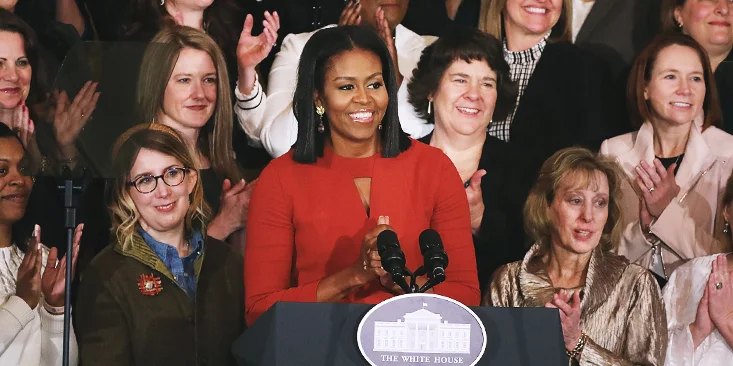Michelle Obama: Redefining Role Model
As we near the end of Barack Obama’s presidency, another tenure is also coming to a close. After eight years, Americans will be saying goodbye to our self-described “mom in chief.”
Michelle Obama’s journey to the city White House began just as the oldest millennial women were entering adulthood. Initially, she was a reluctant public figure—confounding in a world where the unmitigated desire to be seen had just seen the birth of reality television in the previous presidency and was then witnessing the dawn of an explosion in social media—and unlike other first ladies, she neither concealed nor apologized for her reluctance. Yet she did not hide from public view behind the walls of the White House, she opened its doors, danced on the lawn, and declared it “the people’s house.”
She has become an icon whose personal integrity commands a degree of reverence rarely afforded to anyone in the public eye. She remained above the fray even during a nasty election season that seemed to dishearten and disillusion winners and losers alike, not by ignoring the ugliness, but by bypassing the drama and addressing the problems.
Her exhortation during the Democratic National Convention “when they go low, we go high” resonated because it was delivered by someone who has modeled it. She gave an eloquent and impassioned rebuke to Donald Trump’s comments about sexually assaulting women without ever even mentioning him by name.
She is not just a role model for the women who have grown up watching her, she has redefined the category. In Hillary, we had a First Lady who was as educated and ambitious as her husband, but in Michelle, we’ve had a First Lady who has insisted that should be the norm. That conviction is reflected in her initiative to give girls around the world access to education, and in the candid way she has addressed the mental barriers that keep women from reaching their potential. In a conversation with Oprah Winfrey at the United States of Women Summit, she said that she told her daughters and mentees that:
“Our first job in life as women, I think, is to get to know ourselves. And I think a lot of times we don’t do that. We spend our time pleasing, satisfying, looking out into the world to define who we are—listening to the messages, the images, the limited definitions that people have of who we are.”
When Winfrey asked her in the same conversation what men could do, Obama unmincingly replied, “Be better.”
She has spoken openly about the challenges of being the nation’s first African American First Lady and poignantly about the duality of modern womanhood, being perhaps the first First Lady to talk about what it means to be a woman in a way that didn’t seem to pander to anyone’s ideal. She has continually talked about the importance of knowing your worth as a woman and has refused to pay lip service to the miserable rhetoric of the dutiful self-sacrificing woman who always puts herself last.
She has been able to say what no one else in politics can say, whether it be a rejoinder of the political climate or simply a frank appraisal of her own life, because of her uncompromising authenticity. She doesn’t speak to score points, she speaks because she has a point.
On Friday, Michelle Obama delivered her last address in her capacity as First Lady during the National School Counselor of the Year Event, which she began in 2015. Her emotional goodbye reflected the good humor and frankness that make her so uniquely relatable and real. She used the opportunity to urge young people, as she so often has, to work hard, to believe in their own value, and to add their voices to the national conversation. When Michelle says these types of things, you get the sense that she is speaking straight out of her own playbook, and that if you follow her advice, you just might get to reach the heights that she has.
Michelle Obama is leaving the White House just as the youngest millennial women are entering high school. May they never know a world without women like her to look up to.
Public Filter
This column is informed by the belief that an honest and brave conversation about what it means to be a woman is vital to understanding what it means to be a human. Its scope is temporal but its ambition is to discern the essential. Above all, it seeks to connect Milk readers to each other and the world around them. Email Jennimaria with corrections, questions, comments, and suggestions at publicfiltermilk@gmail.com.

